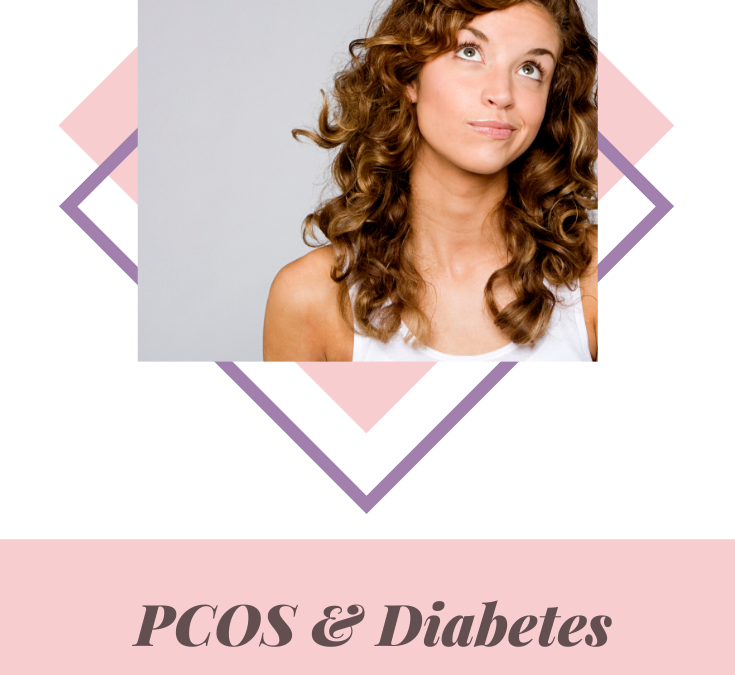Polycystic Ovary Syndrome (PCOS) is a reproductive disorder in which there isn’t enough awareness or education. It’s estimated that 6-12% of women in the United States have PCOS while 2.2-26% of women are affected worldwide. Consequently, PCOS has been linked to an increased instance of type 2 diabetes. But, why is this so? What factors increase the onset of type 2 diabetes in PCOS sufferers?
Page Contents
What is Polycystic Ovary Syndrome?

PCOS can be described as a hormonal disorder that causes you to experience irregular periods, prolonged menstrual cycles, ovulation dysfunction, and hormonal imbalance. These symptoms are the main characteristics associated with the disease. Common symptoms associated with PCOS include:
- Irregular or absent periods
- Prolonged monthly cycles that last beyond 32 days
- Unwanted hair growth on the face, chest, and back
- Acne
- Unexplained weight gain
- Infertility
What is Diabetes?
Diabetes is a condition that alters the way your body processes sugar. Mainly, this is caused by your body’s inability to allow insulin to regulate the uptake of sugar (glucose) into the cells where it can be used for immediate energy or stored for future energy use. Thus causing cells to become insulin resistant. This, in turn, triggers the pancreas to produce more insulin. Which leads to high insulin levels and excessive amounts of sugar in the bloodstream. Four different types of diabetes are common. They are type 1 diabetes, type 2 diabetes, prediabetes, and gestational diabetes. For today’s blog post, we’re going to focus on learning more about types 1 and 2 diabetes. For the most part type, 2 diabetes is most commonly associated with PCOS.

Type 1 Diabetes
Type 1 diabetes is caused by the immune system attacking healthy insulin-producing cells in the pancreas. In turn, this decreases the overall insulin supply which causes high blood sugar. This form of diabetes usually occurs in childhood but can present itself in adulthood. Generally, it is thought to be caused by genetics and environmental factors.
Type 2 Diabetes
Type 2 diabetes occurs when the cells within the body become insulin resistant. What this means is the cells don’t allow insulin to regulate the uptake of sugar (glucose). Thus, causing a buildup of sugar in the bloodstream and elevated levels of insulin within the body. This type of diabetes has been linked to genetics, poor nutrition, and obesity.
Diabetes Symptoms

As with any chronic condition or illness, there are signs and symptoms the body exhibits to let you know there’s an issue. You may experience issues with:
- Increased thirst
- Frequent urination
- Extreme hunger
- Fatigue
- Irritability
- Blurred vision
- Slow-healing sores
- Frequent infections (gum, skin, vaginal infections)
How Does Polycystic Ovary Syndrome Relate to Diabetes?
There are three causes that medical professionals believe increase the risk of diabetes for PCOS sufferers.

Insulin Resistance
Polycystic ovary syndrome is known for increasing insulin resistance within the body. This occurs when the cells fail to use insulin to manage sugar in the blood. Thus, leading the pancreas to produce more insulin and cause elevated insulin and blood sugar levels. But, what exactly causes this resistance to insulin? It’s suspected that the excess production of male androgens may trigger insulin resistance. Additionally, insulin resistance may become an issue due to PCOS related weight gain. Being overweight and having an elevated body mass index (BMI) increases your risk of insulin resistance and diabetes.
Metabolic Syndrome
This condition is a common complication of PCOS. It’s a cluster of conditions that increase your overall risk of heart disease and type 2 diabetes. These conditions include:
- High blood pressure
- High blood sugar
- Abnormal cholesterol and/or triglyceride levels
The combination of these conditions and issues can increase insulin resistance and therefore lead to type 2 diabetes.
Weight
Experiencing complications with PCOS related weight gain, or having excess body fat in the midsection increases your risk. Having an elevated BMI and being overweight increases your body’s insulin resistance, and risk of metabolic syndrome. Both of these complications are linked to type 2 diabetes onset. It’s important to note that while unhealthy weight and BMI in women with PCOS increased the risk of type 2 diabetes; it also was found that women of a healthy weight and BMI with PCOS remained at risk of type 2 diabetes. Discussing with your doctor or a nutritionist ways you can manage symptoms and decrease your risk with nutrition, fitness and lifestyle habits may be in your best interest.
Type 1 Diabetes
While type 2 diabetes is connected with PCOS the American Diabetes Association conducted a study linking PCOS being a risk for women with type 1 diabetes. The study found that PCOS was present in 1 of 4 women with type 1 diabetes. The study speculated that the reason PCOS is often overlooked and misdiagnosed in women with type 1 diabetes was due to two main reasons. The first being that there’s little research data or follow-up studies conducted regarding type 1 diabetes and PCOS. Second, at the time of the study, there was no requirement for recommended PCOS screening to be conducted in women with type 1 diabetes. If you have type 1 diabetes you may want to take it upon yourself to discuss your risk of PCOS with your medical professional.
Evaluating Your Risk
Recognizing the factors that increase your risk of developing PCOS can aid in early diagnosis. If you have a family history of PCOS and diabetes become aware of the symptoms associated with each. And, if you find that you experience these symptoms on a recurrent basis discuss your concerns with your doctor so you can get properly evaluated and tested.
Meet Me in the Comments!
Let’s talk more about today’s topic and increase awareness about PCOS and how it affects women’s health.
Do you have PCOS? If so, how has it impacted your insulin sensitivity? What information should others know regarding PCOS?
About the Author.
 Hi, my name is Kathleen but you can call me Kat. I’m a health and wellness professional turned freelance writer and content creator. My personal struggle with infertility, endometriosis and ovarian cysts made me realize that there just isn’t enough information out there available to women to help them learn more about PCOS, endometriosis, adenomyosis, or fibroids. Basically, there’s a serious lack of information concerning a variety of women’s health topics and issues and well I got fed up. I decided to be the change and created this blog in an effort to spread awareness and advocate for women’s health issues. It has now become my passion to educate and empower women to redefine their health and be their own advocate. You can find me on YouTube and Instagram. If you take the opportunity to visit me on my other platforms don’t hesitate to leave a message, I would love to hear from you!
Hi, my name is Kathleen but you can call me Kat. I’m a health and wellness professional turned freelance writer and content creator. My personal struggle with infertility, endometriosis and ovarian cysts made me realize that there just isn’t enough information out there available to women to help them learn more about PCOS, endometriosis, adenomyosis, or fibroids. Basically, there’s a serious lack of information concerning a variety of women’s health topics and issues and well I got fed up. I decided to be the change and created this blog in an effort to spread awareness and advocate for women’s health issues. It has now become my passion to educate and empower women to redefine their health and be their own advocate. You can find me on YouTube and Instagram. If you take the opportunity to visit me on my other platforms don’t hesitate to leave a message, I would love to hear from you!
References.
(4). The U.S. National Library of Medicine National Institutes of Public Health “Polycystic Ovary Syndrome is a Risk Factor for Type 2 Diabetes.” results from a long term prospective study conducted by Alessandra Gambineri, Laura Patton, Paola Altieri, Uberto Pagotto, Carmine Pizzi, Lamberto Manzoli, and Renato Pasquali
(6). Mayo Clinic “Metabolic Syndrome”
[gravityform id=”1″ title=”true” description=”true”]






